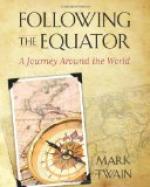“Well, in any case——”
“Wait—there’s more. Leave that American out of the account and see what would happen. There’s nobody on hand to examine your ticket when you arrive. But the conductor will come and examine it when the train is ready to start. It is too late to buy your extra ticket now; the train can’t wait, and won’t. You must climb out.”
“But can’t I pay the conductor?”
“No, he is not authorized to receive the money, and he won’t. You must climb out. There’s no other way. I tell you, the railway management is about the only thoroughly European thing here—continentally European I mean, not English. It’s the continental business in perfection; down fine. Oh, yes, even to the peanut-commerce of weighing baggage.”
The train slowed up at his place. As he stepped out he said:
“Yes, you’ll like Maryborough. Plenty of intelligence there. It’s a charming place—with a hell of a hotel.”
Then he was gone. I turned to the other gentleman:
“Is your friend in the ministry?”
“No—studying for it.”
CHAPTER XXXII.
The man with a new idea is a Crank until the idea
succeeds.
—Pudd’nhead
Wilson’s New Calendar.
It was Junior England all the way to Christchurch—in fact, just a garden. And Christchurch is an English town, with an English-park annex, and a winding English brook just like the Avon—and named the Avon; but from a man, not from Shakespeare’s river. Its grassy banks are bordered by the stateliest and most impressive weeping willows to be found in the world, I suppose. They continue the line of a great ancestor; they were grown from sprouts of the willow that sheltered Napoleon’s grave in St. Helena. It is a settled old community, with all the serenities, the graces, the conveniences, and the comforts of the ideal home-life. If it had an established Church and social inequality it would be England over again with hardly a lack.
In the museum we saw many curious and interesting things; among others a fine native house of the olden time, with all the details true to the facts, and the showy colors right and in their proper places. All the details: the fine mats and rugs and things; the elaborate and wonderful wood carvings—wonderful, surely, considering who did them wonderful in design and particularly in execution, for they were done with admirable sharpness and exactness, and yet with no better tools than flint and jade and shell could furnish; and the totem-posts were there, ancestor above ancestor, with tongues protruded and hands clasped comfortably over bellies containing other people’s ancestors—grotesque and ugly devils, every one, but lovingly carved, and ably; and the stuffed natives were present, in their proper places, and looking as natural as life; and the housekeeping utensils were there, too, and close at hand the carved and finely ornamented war canoe.




